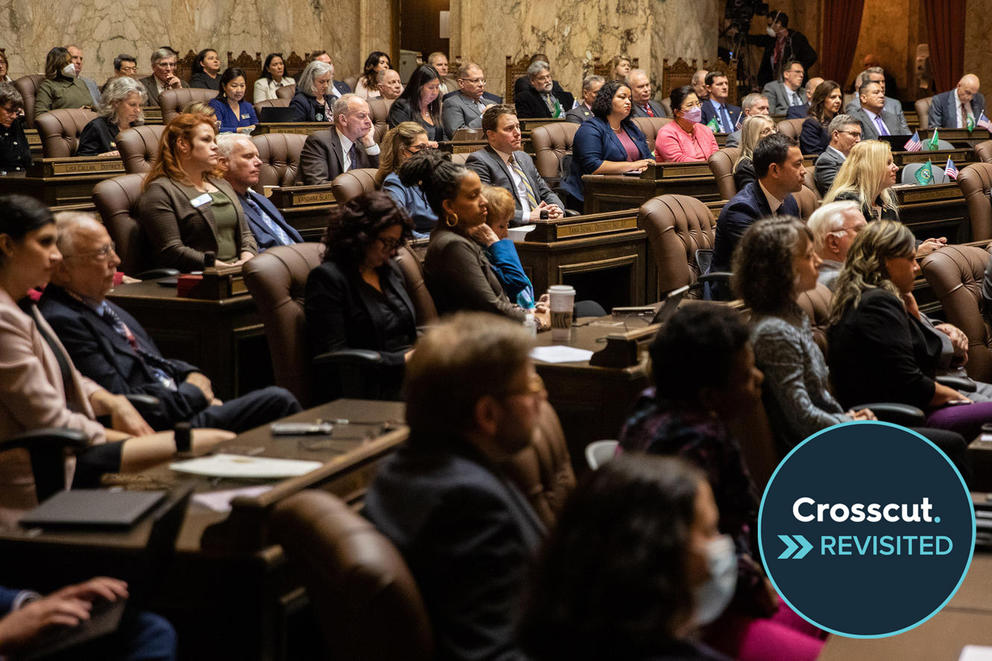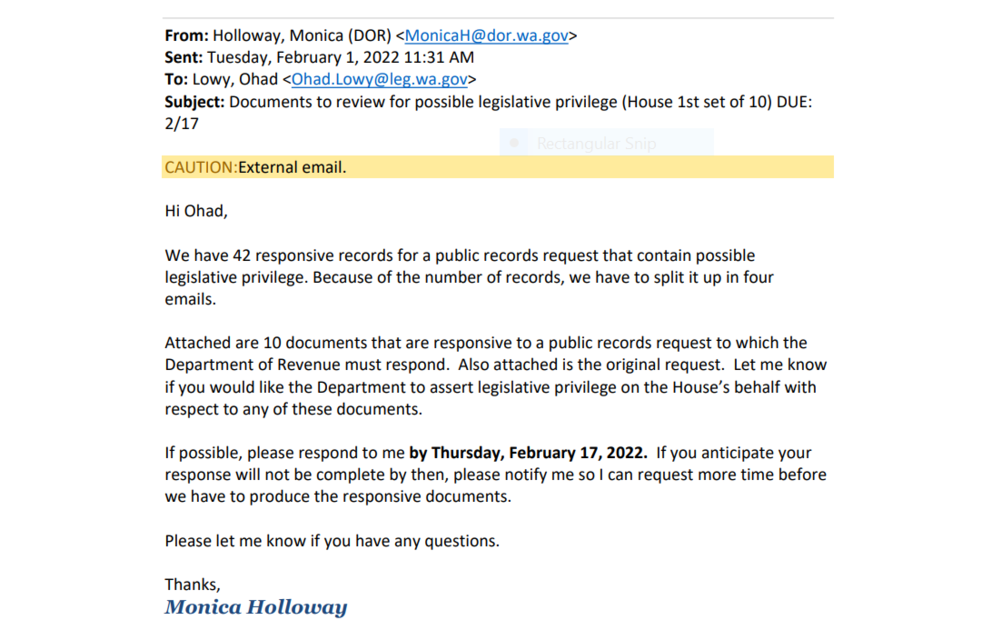DOR’s legislative privilege policy came to light after public records obtained by Crosscut showed an agency staffer forwarding records to the Legislature to peruse in case they wanted to black out documents before their release to the public. Those records were requested by the Washington Policy Center, a conservative think tank that was interested in documents related to the capital-gains tax that Inslee had signed into law the prior spring.
DOR rolled back its legislative privilege policy after Crosscut and McClatchy – which owns The Tacoma News Tribune, the Tri-City Herald, The Bellingham Herald and The Olympian – began asking questions.
In an email, DOR spokesperson Mikhail Carpenter acknowledged that the agency’s February 2022 email offering public records to a state House lawyer for redaction was “overly broad in its application” of the agency’s own policy.
A spokesperson for Inslee went further.
“Executive branch agencies do not have authority to exert legislative privilege,” Mike Faulk wrote in an email. “DOR understands this and suspended their policy.”
Despite its policy, the agency never actually blacked out documents with legislative privilege, according to Carpenter and a top House official.
DOR’s legislative privilege policy is the latest twist in a long and troubled period for government transparency in Washington that could continue in the new year.
In January, Washington’s legislative leaders acknowledged they had been quietly using a new exemption, which they call legislative privilege, that they say allows lawmakers to black out emails, text messages and other documents requested by the public and press.
It was a rough rollout: Reporting by Crosscut and McClatchy since then documented lawmakers saying their documents were blacked out without their permission. In one case, the Senate’s Democratic majority leader acknowledged he blacked out other lawmakers’ records. It also came to light that legislative officials tried to get the state Supreme Court to sanction a constitutional secrecy privilege back in 2006.
Meanwhile, senior legislators pushed a bill written for them by powerful lobbyists – the Association of Washington Cities – that could weaken the public’s ability to get public records. Lawmakers may attempt again to pass House Bill 1597 in the coming legislative session.
Amid this epidemic of government obscurantism, the tiny entity tasked with trying to increase government transparency – the Washington Sunshine Committee – even considered ending itself. The committee’s ultimate fate could also be decided in the coming session.
Back in January, McClatchy broke the news that lawmakers had been quietly blacking out emails, texts, memos and other communications in violation of a 2019 Supreme Court order that those documents are disclosable under the 1972 voter-approved Public Records Act.
Lawmakers’ use of legislative privilege quickly drew a legal challenge from a former Democratic legislative staffer and the Washington Coalition for Open Government. Last month, lawmakers got an initial victory in Thurston County Superior Court, in a case that is expected to go up to the Washington Supreme Court.
Lawmakers are betting that the high court will help bake a permanent secrecy clause for them into the state constitution, as some other states have. But that’s not what happened the last time the Washington Supreme Court was asked to endorse a legislative privilege.
Around the United States, notions of privilege are increasingly being used to conceal taxpayer-funded records from the public, according to David Cuillier, director of the Freedom of Information Project at the Brechner Center for the Advancement of the First Amendment.
As Washington’s Democratic-controlled Legislature pursues legislative privilege, Republican governors in Florida, Nebraska and Arkansas are claiming executive privilege so they can withhold records, said Cuillier, a former Washington journalist who wrote for The Everett Herald and The Vancouver Columbian, among other publications.
“We’re seeing this around the country, this rise of privilege, privilege to hide from the public,” said Cuillier.
“It’s like an avalanche of secrecy that’s covering the country,” he added.
Secrecy spark
DOR is a key state agency that administers roughly 60 categories of taxes and does other work on fiscal policies, such as tax analysis and helping to author proposed laws.
On May 4, 2021, Inslee signed into law Senate Bill 5096, a new tax on some capital gains. This represented a landmark moment for Democratic lawmakers pushing to change the state’s regressive tax system. Conservatives have strongly opposed the tax and filed a legal challenge. But the Washington Supreme Court this spring upheld the tax as constitutional.
Right around the time Inslee signed the bill, Pam Lewison, the agricultural research director for the Washington Policy Center, made a records request to DOR. It sought: “any and all communications, draft legislative language, or other documents related to SB 5096, specifically related to agricultural practices, farmland taxation, [and] agricultural exemptions” related to the tax legislation.
It was that request that DOR says sparked a February 2022 email from DOR staffer Monica Holloway to Ohad Lowy, House counsel and one of the Legislature’s top lawyers.
“We have 42 responsive records for a public records request that contain possible legislative privilege … ” wrote Holloway, an analyst with DOR’s policy division, adding: “Attached are 10 documents that are responsive to a public records request to which the Department of Revenue must respond.”
“Also attached is the original request,” she continued. “Let me know if you would like the Department to assert legislative privilege on the House’s behalf with respect to any of these documents.”
Lowy later forwarded that email to Cathy Hoover, a senior attorney for House Republicans.
“As you know, DOR sends us emails to review for leg privilege,” he wrote in the first line of the email. The remainder of that email was blacked out, citing a different exemption known as attorney-client privilege.
Carpenter, the DOR spokesperson, described the agency’s reasoning for its legislative privilege policy as needed “to prevent a situation where a public records request resulted in someone receiving work product (such as bill drafts and range of impact estimates) before the party on whose behalf they were drafted had time to fully consider them.”
But the February 2022 email came months after the bill had already become law, which Carpenter acknowledged after questions from Crosscut and McClatchy.
“The intent of the policy was for the purpose of draft[s] of legislation but the questions you raise are valid: one of the reasons the agency has suspended the policy is because it was overly broad in its application such as the one referenced,” Carpenter told Crosscut in an email.
In an email, House Chief Clerk Bernard Dean, the top nonpartisan official in that chamber, declined to comment on legal issues, citing the litigation over records.
“Discussions around legislative privilege in the Legislature pre-date any communications that may have taken place with the Department of Revenue in 2017,” Dean wrote in an email. “That said, I am unaware of any circumstances where members have asserted legislative privilege on documents held by DOR.”
In an interview, Lewison said she filed the request to learn about how the new law might apply to people selling their farms to use as a retirement asset. She didn’t know DOR had offered her records to another branch of government for redaction until being contacted by Crosscut and McClatchy.
“I would hope that they would recognize and realize that members of the public, whomever they may be, they have a right to know what kind of policies are being enacted,” she said. “And be able to ask questions.”
This report was produced in collaboration with McClatchy, which owns The News Tribune (Tacoma), The Olympian, The Bellingham Herald and the Tri-City Herald.




